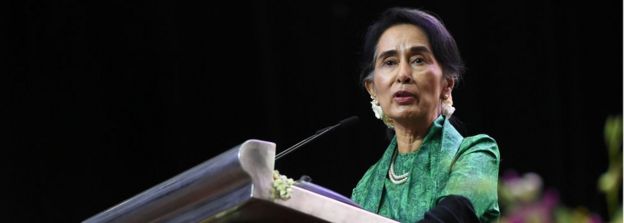Why is the Burmese darling of the Western powers — de-facto leader of Myanmar Aung San Suu Kyi — overseeing ‘crimes against humanity’
Amnesty accuses Myanmar military of ‘crimes against humanity’
BBC
Amnesty International says the actions of Myanmar’s military may constitute “crimes against humanity” after allegations of violence against the Rohingya Muslim minority.
The rights group’s latest report accuses Burmese forces of murdering civilians, rape, torture and looting.
Myanmar’s military has denied accounts of atrocities and says it is conducting anti-terrorist raids in Rakhine.
It comes as regional leaders gather in Yangon to discuss the violence.
It is extremely rare for Asean, the 10-nation regional body representing South East Asia, to discuss the affairs of a member country.
- Who will help the Rohingya?
- Images show Rohingya villages ‘destroyed’
- UN official: Myanmar wants ‘ethnic cleansing of Rohingya
Reports of violence in Rakhine state began in October, after the army launched an anti-insurgency operation.
The operation started after border police were attacked by a militant group, which Amnesty said was composed primarily of Rohingya.
In November a UN official said Myanmar was conducting “ethnic cleansing” of Rohingya, while Human Rights Watch has published satellite images of razed villages.
‘Suu Kyi did not want this meeting’ – Jonah Fisher, BBC News, Yangon
 AFP/GETTY IMAGES
AFP/GETTY IMAGESThe de-facto leader of Myanmar Aung San Suu Kyi did not want to hold this meeting. She accuses the international community of stirring things up when raising the plight of Myanmar’s Rohingya Muslim minority.
But the two South East Asian countries with the biggest Muslim populations – Indonesia and Malaysia – forced her hand.
So through gritted teeth Ms Suu Kyi will brief them on the last two months in Rakhine state. They are likely to hear only one side of the story.
Ms Suu Kyi, in public and in private meetings with diplomats, maintains that the Burmese military has been following the rule of law – and rejects allegations of atrocities.
Human rights groups disagree. They say soldiers have responded to the emergence of a new Rohingya armed group by killing and raping civilians and burning villages.
‘Humanitarian catastrophe’
Amnesty said it interviewed 35 victims and 20 others involved in humanitarian and reporting efforts in Myanmar, also known as Burma.
It described a “humanitarian catastrophe” with random killings, arbitrary arrests and detentions, rapes, torture, looting and destruction of property including the torching of 1,200 homes and other buildings like schools and mosques.
Amnesty said the army’s actions are “part of a widespread and systematic attack against the Rohingya population in northern Rakhine state and may therefore constitute crimes against humanity”.
It is unclear how many civilians have died in the latest conflict as the government has restricted journalists and aid workers from accessing the area.
Amnesty estimates at least 27,000 Rohingya have fled to neighbouring Bangladesh since October, placing a strain on impoverished communities along the border. It also accused the Bangladeshi government of actively turning away refugees.
It called on the Burmese government and Aung San Suu Kyi to order a stop to the violence, publically condemn rights violations, allow unimpeded access to Rakhine and launch an impartial investigation with the UN.
The Myanmar government has set up its own investigation team led by former general and current vice president Myint Swe. It’s also invited an Advisory Commission chaired by former UN Secretary General Kofi Annan to look at long term solutions to Rakhine state’s problems.
Ms Suu Kyi has defended her government’s handling of the issue and accused the international community of stoking resentment.
Members of the Muslim Rohingya community are widely regarded as illegal migrants in majority-Buddhist Myanmar, and have experienced persecution for decades amid simmering ethnic tensions in Rakhine.
